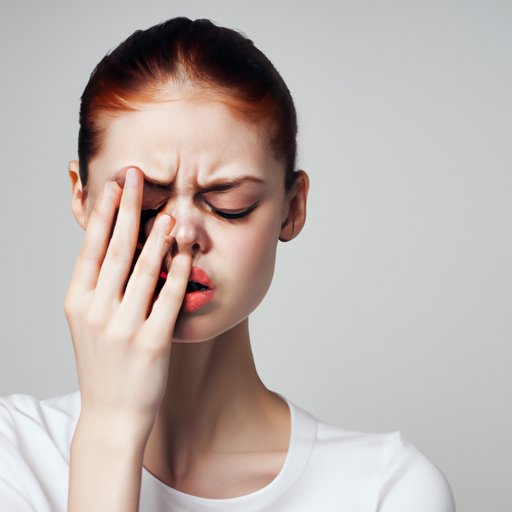
I. Introduction
Crying has been a natural human response to emotion and stress for thousands of years. It is a healthy expression of one’s emotions, but it can also bring a host of physical and mental symptoms, including exhaustion. In this article, we explore why crying makes you tired and the science behind post-crying fatigue. We delve into the many factors that contribute to emotional stress and exhaustion after crying and provide practical tips and resources for coping with post-crying fatigue.
II. The Science Behind Why Crying Makes You Physically and Mentally Exhausted
Crying is a physical and emotional response that involves a variety of physiological and psychological responses. When a person cries, their heart rate and blood pressure both increase, and their body temperature drops. These responses lead to a feeling of fatigue and exhaustion, which can persist for hours or even days after crying has stopped.
Research has shown a link between crying and exhaustion, specifically with the release of stress hormones like cortisol and adrenaline. These hormones prepare the body for the “fight or flight” response, which can be physically and mentally taxing. Additionally, the emotional stress that leads to crying can also have a significant impact on energy levels well after the crying itself has stopped.
III. Exploring the Connection Between Emotional Stress and Exhaustion After Crying
There is a clear connection between emotional stress and post-crying exhaustion. Emotional stress can manifest in the body in a variety of ways, including through crying. Crying may be a physical manifestation of emotional stress that can deplete energy levels and contribute to feelings of exhaustion.
In addition, there is a strong link between emotional stress and fatigue, which can be exacerbated by crying. When a person is experiencing high levels of emotional stress, their body may produce increased levels of cortisol, a hormone associated with stress and fatigue. This hormonal response to emotional stress can contribute to feelings of exhaustion after crying and contribute to a cycle of emotional stress and fatigue.
IV. Tears and Fatigue: Understanding the Physiology and Psychology of Crying
While crying can be physically and emotionally exhausting, it also provides psychological and physiological benefits. Shedding tears can help improve moods, release stress, and improve overall mental health. It can also stimulate the release of endorphins, which can lead to a feeling of euphoria and an increase in energy.
However, not all tears are created equal. There are three main types of tears: basal, reflex, and emotional. Basal tears lubricate and protect the eyes, while reflex tears are produced in response to irritants like smoke or wind. Emotional tears are the tears shed during an emotional response such as crying.
Two kinds of hormones – prolactin and adrenocorticotropic hormone (ACTH) – are found in emotional tears, which helps reduce stress and relieve pain. However, this can also lead to increased fatigue and exhaustion as the body uses up energy to produce these hormones.
V. Is Crying Actually Draining Our Bodies Of Energy? A Scientific Perspective
There is considerable debate in the scientific community about whether or not crying actually depletes energy. While it is widely accepted that crying can lead to feelings of fatigue and exhaustion, the biological mechanisms behind this are still unclear. Some researchers believe that crying may lead to the release of hormones that can both drain energy and provide a sense of relief. Others suggest that crying is part of a larger system that regulates and restores our bodies’ balance and may even promote healing.
VI. Debunking Myths About Crying: The Real Reasons It Makes You Tired
There are many myths surrounding crying and fatigue that persist to this day. One common myth is that crying is a sign of weakness or lack of control. However, crying is a natural and healthy emotional response to stress, and it is important to allow yourself to feel and express emotions in a healthy way.
Another popular myth is that crying can be easily controlled or stopped with willpower. In reality, crying is a reflex that occurs when the body is overwhelmed with emotion, and it is not always possible to control or stop it.
The reality of why crying makes you tired is much more complex than these common myths suggest. The combination of physical and emotional stress, hormonal responses, and the psychological benefits and drawbacks of crying all contribute to post-crying fatigue.
VII. From Stress Hormones to Sleep Disruptions: Analyzing Why Crying Leads to Fatigue
Many of the mechanisms behind post-crying fatigue are related to the body’s stress response. When a person cries, their body produces hormones like cortisol and adrenaline, which prepare the body for a “fight or flight” response. These stress hormones can lead to feelings of exhaustion and fatigue.
In addition, crying can disrupt sleep patterns. When a person is experiencing emotional stress, they may have difficulty falling or staying asleep. This lack of restful sleep can contribute to feelings of exhaustion and fatigue over time.
VIII. Coping with Post-Crying Fatigue
If you are experiencing post-crying fatigue, there are many practical steps you can take to cope and promote feelings of energy and well-being. Some things to consider include:
- Taking a break to rest and recharge
- Engaging in physical activity or exercise
- Practicing relaxation techniques such as deep breathing and meditation
- Talking to a trusted friend or mental health professional about your emotional stress
- Seeking additional support through therapy or support groups
IX. Conclusion
Post-crying fatigue is a common and understandable phenomenon that can impact a person’s physical and psychological well-being. Understanding the science behind why crying makes us tired can help us better cope with post-crying exhaustion and find ways to support our bodies and minds during times of emotional stress. Remember to take care of yourself and seek support when needed.





